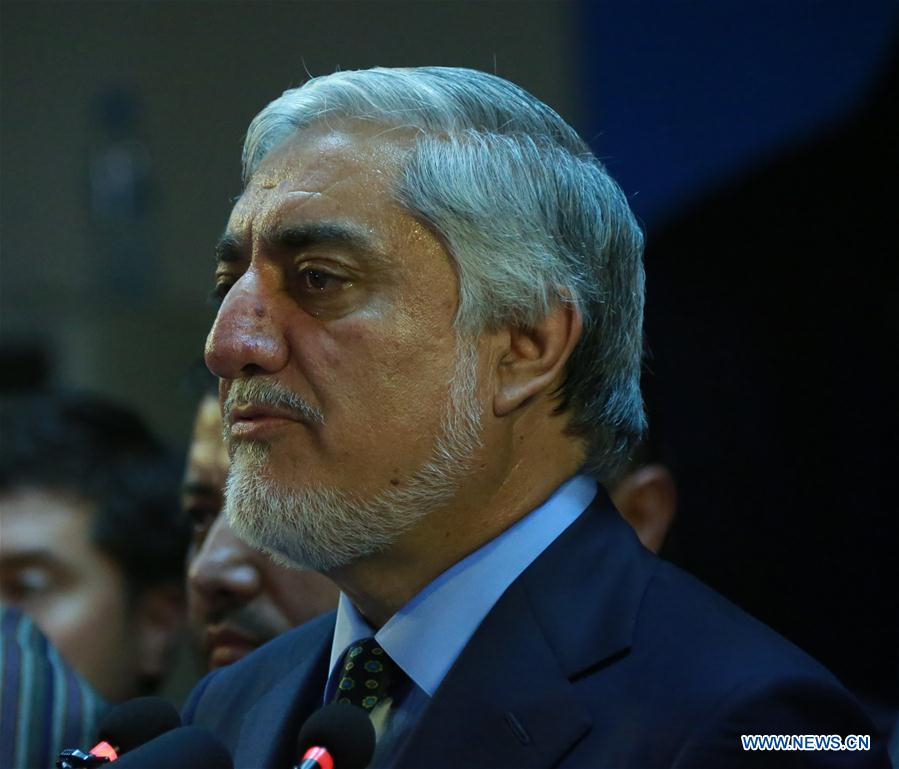
Mohammad Ashraf Ghani (C) attends his swearing-in ceremony at the presidential palace in Kabul, Afghanistan, March 9, 2020. /Xinhua
Mohammad Ashraf Ghani (C) attends his swearing-in ceremony at the presidential palace in Kabul, Afghanistan, March 9, 2020. /Xinhua
Editor's note: Mian Abrar is Resident Editor of Pakistan Today Islamabad and has a special focus on regional peace, development and conflicts. The article reflects the author's opinions, and not necessarily the views of CGTN.
While the world is focused on fighting the menace of the coronavirus, Afghan President Dr. Ashraf Ghani and his adversary Dr. Abdullah Abdullah, who recently served as chief executive, are locked in a dialogue to help settle internal differences following the disputed election results which termed Ghani as victorious in recent elections.
The second phase of the U.S.-brokered Taliban peace process was supposed to be an Intra-Afghan negotiation scheduled 10 days after the agreement signed by the U.S. and the Taliban.
With recent Afghan presidential elections gone contentious, the post-presidential election dispute between Ghani and Abdullah further contributed to the delay in launching intra-Afghan dialogues.
Though, teams around the two presidential contenders have struggled to settle their differences and form a joint administration, yet there is no final agreement on the delegates from Kabul to talk with the Taliban.
The talks between Ghani and Abdullah are a result of continued pressure from the United States and its allies along with regional powers to form an inclusive government which would open dialogue with Afghan Taliban.
Dialogue between Ghani and Abdullah started last week and an outcome is likely to be reached in a day or two. The proposal both Ghani and Abdullah groups are discussing much emphasize on the independence of the National Reconciliation Council. The protocol of the Chairman of the Council is asked to be as prime minister – a proposal Ghani is opposing tooth and nail.
A Supreme State Council is proposed that will guide the government in the policy issues like Iran. But I don't know what its legal status will be.
The true implementation of the agreement is another matter of concern. Hence, Abdullah wants that four members as witnesses be appointed for mediations including former Afghan President Hamid Karzai, Northern Alliance leaders Abdul Rab Rasool Sayyaf, Younus Qanooni and Mohammad Karim Khalili as witnesses and United Nations, European Union (EU), the UK and the U.S. as the guarantors should sign the agreement.

Abdullah Abdullah attends a press conference in Kabul, Afghanistan, September 30, 2019. /Xinhua
Abdullah Abdullah attends a press conference in Kabul, Afghanistan, September 30, 2019. /Xinhua
However, two things seem to be impossible and Abdullah's team doesn't emphasize on those issues anymore including invalidation of results of the recent elections in Afghanistan; and creation of the slot of prime minister.
Afghanistan today is practically divided between forces allied with Dr. Ghani's regime which has control in major cities and Kabul while 60 percent of territory is controlled by Afghan Taliban. Areas in the North are contested between Uzbek, Tajik, Hazara tribes while the Taliban also claim some pockets near hills.
Following peace accord between the Taliban and the U.S., Ghani and Abdullah have been forced to resolve internal disputes as international donors, including the U.S., are inclining toward the Afghan Taliban, the only gainer of this tussle. The U.S. and its partners have warned Dr. Ghani that they might further cut in aid money and decide for a premature withdrawal if Ghani and Abdullah failed to resolve issues.
Since last month, the Northern Alliance parties have already entered into another active war with the Taliban who are making little gains in areas controlled by Northern Alliance. In spite of the pending peace process, there is no flexibility shown in the violent activity of Taliban.
The Tajiks may not stand by Abdullah for long. The defection has already started in their backyard. COVID-19 has curtailed the capacity to mobilize the masses against Dr. Ghani, the only effective mean to pressurize him. The ongoing tussle between the two political opponents might reach an acceptable settlement but the questions remain to be answered are how to overall decline and how to stop the Taliban's war onslaught into areas controlled by Northern Alliance.
The fresh round of fierce violence between the Taliban and the non-Pashtun communities loyal to the former Northern Alliance in the Northern parts of the country has reached an unmatched level since 2001. It is time for all domestic and regional stakeholders to review their thoughts for a functional settlement with a working formula and that is certainly not a strong centralized system.
A country like Afghanistan with such a rich ethnic, lingual and religious diversity cannot be managed with the outdated idea of Nation-state theory with a centralized administration.
It is conceivable that the pressure on Kabul from all sides will lead to a deal between the presidential teams and talks with the Taliban will eventually start. But with the current arrangement between opposing Afghan presidential camps the political schism is persisting, rendering the prospect for any agreement with the Taliban through intra-afghan dialogue a distant reality.
No serious observer should be taken in by the misplaced optimism portraying the Afghan mission a success. War and political instability in Afghanistan are intrinsic with its solution hidden somewhere deep inside its historically repressed sense of collectiveness.
Hence, while the U.S. and its allies are building pressure on the Taliban and the Afghan regime to enter a meaningful dialogue, regional powers like China, Pakistan and Russia should use their good offices to broker a long-lasting deal carefully taking care of all the Afghan groups and parties involved as failure is not an option.
(If you want to contribute and have specific expertise, please contact us at opinions@cgtn.com.)